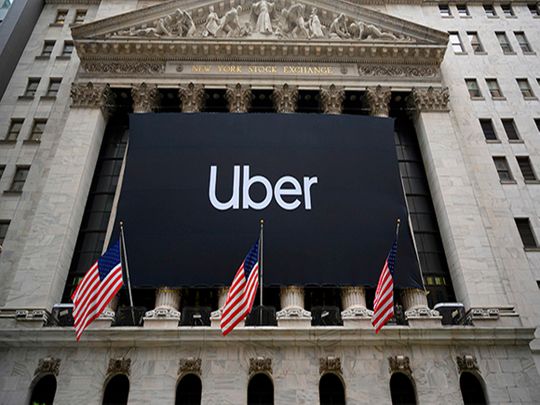
ride-hailing company failed to show expected benefits of easing price competitionUber Technologies Inc reported lower-than-expected revenue for the second quarter on Thursday, sending shares down 12 per cent as the largest US ride-hailing company failed to show expected benefits of easing price competition.
Uber’s net loss also widened to $5.24 billion (Dh19.24 billion), or $4.72 per share, in the quarter ended June 30 from $878 million, or $2.01 per share, a year earlier, reflecting $3.9 billion of stock-based compensation expenses related to its IPO earlier this year.
Chief Executive Officer Dara Khosrowshahi said in a press call the competitive environment is starting to rationalize and it has been “progressively improving” since the first quarter.
Smaller rival Lyft Inc said on Wednesday pricing had become “more rational”, meaning the company should spend less on promotions and incentives to win market share. It raised its revenue outlook on Wednesday. Lyft shares fell 2 per cent after Uber’s report. Both ride hailing companies had seen share rise during regular trade.
Uber’s Khosrowshahi said the company is making its decision separate from Lyft.
Both the companies have historically relied on subsidization to attract riders and have been spending heavily to expand services into areas such as self-driving technology for Lyft and food delivery for Uber.
Uber’s costs rose 147 per cent to $8.65 billion in the quarter, including a sharp rise in spending for research and development.
“While we will continue to invest aggressively in growth, we also want it to be healthy growth, and this quarter we made good progress in that direction,” Chief Financial Officer Nelson Chai said in a statement.
Total revenue rose 14.4 per cent to $3.17 billion, but fell short of average analyst estimate of $3.36 billion, according to IBES data from Refinitiv.
The company, which has not yet made clear whether it will make a profit, is trying to convince investors that growth will come not only from its ride services, but also from other logistics and food delivery services.
Gross bookings, a measure of total value of rides before driver costs and other expenses, rose 31 per cent from a year earlier to $15.76 billion. Analysts on average were expecting $15.80 billion.
Uber said its monthly active users rose to 99 million globally, from 93 million at the end of the first quarter and 76 million a year earlier.












